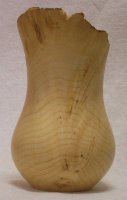Small rhododendron NE hollow form.
Rhododendron burl from wood I was given in August. The tree had been down and cut into firewood lengths for about a week before it was given to me. The waxed blank sat outside my shop until early November when I roughed it out. I wrote the date on the bottom with a new gel pen and it disappeared while soaking in alcohol. Not all gel pens are created equal.
 The data card for the hollow form. I took the piece out of the alcohol on the 12th and wrapped it but didn’t take the first weight until 24 hours later. All weights are in grams. The piece was effectively dry on the 17th when I took a long weekend. It only lost 3 grams over the next week before final turning it on the 24th. The number (224) is the sample weight of the soaking solution when I took the piece out and corresponds to 92% alcohol.
The data card for the hollow form. I took the piece out of the alcohol on the 12th and wrapped it but didn’t take the first weight until 24 hours later. All weights are in grams. The piece was effectively dry on the 17th when I took a long weekend. It only lost 3 grams over the next week before final turning it on the 24th. The number (224) is the sample weight of the soaking solution when I took the piece out and corresponds to 92% alcohol.
 The roughed out hollow form soaked about a week before I had a chance to take it out. It was roughed out to about 1/4".
The roughed out hollow form soaked about a week before I had a chance to take it out. It was roughed out to about 1/4".
 The black line on the base insicates where the inside bottm is.
The black line on the base insicates where the inside bottm is.
 Nice eyes on the low side. Base 1 1/4". Body 2 1/4 maximum and neck 1 3/4".
Nice eyes on the low side. Base 1 1/4". Body 2 1/4 maximum and neck 1 3/4". Some flame figure on the high side. Height is 3 7/8". Top through the neck is 1/16" thick. Thickness increases midway through the body to 1/8" at the base. Finished piece weighs 33 grams.
Some flame figure on the high side. Height is 3 7/8". Top through the neck is 1/16" thick. Thickness increases midway through the body to 1/8" at the base. Finished piece weighs 33 grams.
Sanded to 600 initially and between coats. Finished with 2 coats of Rockler’s Gel Polyurethane. No buffing.
I asked about turning rhododendron a couple months ago and the advise was it will crack and split no matter what I do. I beg to differ with the advise. I also have two crotch bowls that also dried without cracking or excessive warping.
Comments welcome.
Dave
 The data card for the hollow form. I took the piece out of the alcohol on the 12th and wrapped it but didn’t take the first weight until 24 hours later. All weights are in grams. The piece was effectively dry on the 17th when I took a long weekend. It only lost 3 grams over the next week before final turning it on the 24th. The number (224) is the sample weight of the soaking solution when I took the piece out and corresponds to 92% alcohol.
The data card for the hollow form. I took the piece out of the alcohol on the 12th and wrapped it but didn’t take the first weight until 24 hours later. All weights are in grams. The piece was effectively dry on the 17th when I took a long weekend. It only lost 3 grams over the next week before final turning it on the 24th. The number (224) is the sample weight of the soaking solution when I took the piece out and corresponds to 92% alcohol. The roughed out hollow form soaked about a week before I had a chance to take it out. It was roughed out to about 1/4".
The roughed out hollow form soaked about a week before I had a chance to take it out. It was roughed out to about 1/4". The black line on the base insicates where the inside bottm is.
The black line on the base insicates where the inside bottm is. Nice eyes on the low side. Base 1 1/4". Body 2 1/4 maximum and neck 1 3/4".
Nice eyes on the low side. Base 1 1/4". Body 2 1/4 maximum and neck 1 3/4". Some flame figure on the high side. Height is 3 7/8". Top through the neck is 1/16" thick. Thickness increases midway through the body to 1/8" at the base. Finished piece weighs 33 grams.
Some flame figure on the high side. Height is 3 7/8". Top through the neck is 1/16" thick. Thickness increases midway through the body to 1/8" at the base. Finished piece weighs 33 grams.Sanded to 600 initially and between coats. Finished with 2 coats of Rockler’s Gel Polyurethane. No buffing.
I asked about turning rhododendron a couple months ago and the advise was it will crack and split no matter what I do. I beg to differ with the advise. I also have two crotch bowls that also dried without cracking or excessive warping.
Comments welcome.
Dave


